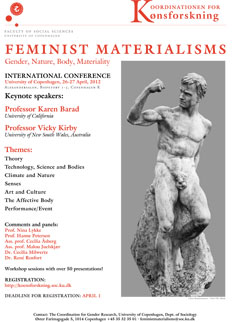International conference:
Feminist Materialisms - Gender, Nature, Body, Materiality

On the 26-27th April 2012, the Coordination for Gender Research organised the international conference Feminist Materialisms: Gender, Nature, Body, Materiality. The conference received an overwhelming interest with over 300 participants from all over the world.
The aim of the conference was to present and discuss new feminist materialisms and related theories, methodologies and case studies. The material turn opens a new way of analysing materiality, yet it also requires development of new methodological and scientific tools as well as new approaches and themes.
Download the Feminist Materialisms conference folder here, includes abstracts and information on keynote speakers.
Speakers included:
- Professor Karen Barad, University of California, USA
- Associate Professor Vicki Kirby, University of New South Wales, Australia
- Professor Hanne Petersen, University of Copenhagen, Denmark
- Professor Nina Lykke, Linköping University, Sweden
- Associate Professor Cecilia Åsberg, Linköping University, Sweden
- Associate Professor Malou Juelskjær, Aarhus University, Denmark
Materiality has for a long time been a challenge for feminist theorising, yet the role of materialisms has currently entered the field of gender studies across a range of disciplines. The works of Karen Barad, Vicki Kirby and Nina Lykke have among others been major inspirations on the notions of the material turn. Their research opens up new approaches and conceptualisations of gender, body, nature, matter and materiality.
The international conference on Feminist Materialisms focused on these new angles on materiality as well as related theories, methodologies and case studies, and touched upon questions such as:
- How can feminism relate to bodily differences and the agency of materiality without ending in biology and essentialism?
- How can notions of intra-active agency be used in practice - what are the strengths and weaknesses?
- How can meetings between body, technology and discourses be analysed?
- What are the effects of theorizing body and gender while including an agency of materiality?
